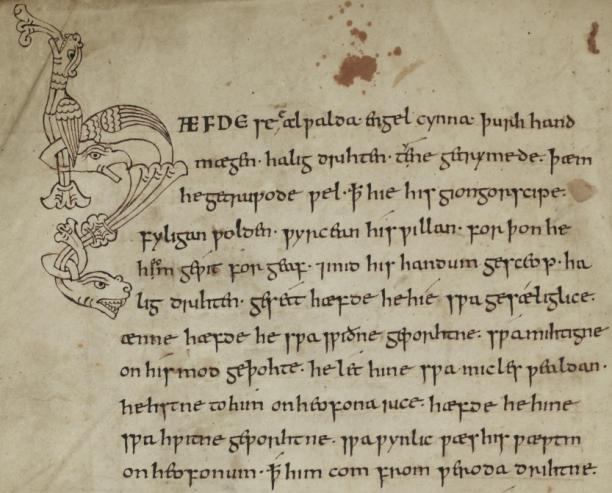Bethesda cites Old English recordings of Beowulf as one of the chief inspirations for how the dragon language would sound. However, the connection goes much deeper than that.
I'm currently reading through Beginning Old English, and I've come across some interesting passages that apply as much to Dovahzul as they do to Old English. I thought I'd share some excerpts that I think help reveal Bethesda's original vision for the language.
The Alphabet
It is a considerable task to create a written form of a language that for 400 years had mainly been spoken. The scribes who occasionally glosed difficult Latin words in Old English had used a mixture of the roman alphabet used for Latin, and the ancient runic alphabet used by Germanic tribes on the continent. Runes were straight-sided characters, suitable for carving on hard surfaces, such as wood, bone, or stone.
p. 8
Like Old English, Dovahzul features straight-sided characters meant for carving, only in this case by a dragon's claw. It's interesting to think about how long Dovahzul existed as a spoken language only, or if a writing system was inherent to the language.
Similarly, the use of modern punctuation imposes a choice between capitals and lower-case ... which in turn imposes an interpretation of personal name or vocabulary word. ... Notice particularly the almost total lack of manuscript punctuation. The use of commas, exclamation marks, full stops, question marks and so on in printed editions of Old English poetry is modern, and varies from edition to edition.
p. 105-106
This passage is discussing personal names (which we'll get to later), and how it's difficult to recognize them because the manuscripts do not feature capitalization. Lack of punctuation is something that Old English and Dovahzul also share, and for Dovahzul I think it's something very valuable to its tone that would be lost with the use of invented punctuation.
Below are some images of Old English manuscript and Dovahzul writing.


Personal Names
Old English personal names were made up vocabulary words, often in compounds that do not make literal sense. The main characters in one of the texts ... are called Cynewulf and Cyneheard, names that translate as 'royal-wolf' and 'royal-hard'. The hero of the epic poem Beowulf has a name that literally means 'bee-wolf', but figuratively perhaps means 'bear' (bee = honey, wolf = fierce animal; fierce animal that steals honey = bear). This is an aspect of Old English on which J. R. R. Tolkien drew extensively when naming characters in The Lord of the Rings. For instance, the name of the villain, Saruman ..., is taken from OE searu 'trickery' plus 'man', to give a compound with the sense of 'man of trickery'.
p. 31
Bethesda followed suit by naming their dragons with vocabulary words, in compounds that don't make literal sense (Odahviing = "snow hunter wing," or more conventionally, "winged snow hunter"), but convey the aspects and elements important to that dragon's character. This ended up becoming both neat lore and an awesome gameplay mechanic, in which a dragon's name is also a Shout.
The Dragon Priests also borrow names from vocabulary.
Compound Words
Anglo-Saxon poets often use roundabout expressions, known as 'circumlocution' or 'euphemism', in preference to more straightforward terminology. For instance, God is referred to here as heofan-rÄ«ces Weard 'Guardian of the heavnly kingdom' and man-cynnes Weard 'guardian of mankind', while people are described as eorþan bearnum 'the children of the earth'.
Compounding is particularly common in Old English poetry. It tends to increase the weight of meaning, since a compound can express an idea more concisely than a descriptive phrase....
Some compounds are metaphorical rather than literal, and are known as 'kennings'. The meaning of middan-geard ('middle-dwelling'; the source of Tolkien's 'Middle-Earth' ... ) derives from the medieval belief that earth was mid-way between Heaven and Hell.
p. 100
Dovahzul clearly takes inspiration here with compounds like suleyksejun "dominion" (lit. "power-of-king") and vennesetiid "the currents of time" (lit. "winds of time"). We also see euphemism is a number of Word Walls, for example this one which references Hermaeus Mora:
Pah werid morokei Miraak
zok suleykaar do pah
sonaak wen mul bolaav
naal fahluaan do julAll praise the glorious Miraak,
most powerful of all
priests, whose strength was granted
by the gardener of mankind.
"Gardener of mankind" here refers to Hermaeus Mora, rather than naming the Daedric Prince directly.


